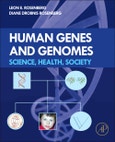- Bridges the gap between basic human genetic understanding and one of the most promising avenues for advances in the diagnosis, prevention and treatment of human disease
- Includes the latest information on diagnostic testing, population screening, predicting disease susceptibility, pharmacogenomics and more
- Explores ethical, legal, regulatory and economic aspects of genomics in medicine
- Integrates historical (classical) genetics approach with the latest discoveries in structural and functional genomics
Table of Contents
Part 1 Introduction and Core Concepts 1. Framing the Field 2. Introducing the CORE CONCEPTS 3. Genetic Variability 4. Growth, Development, and Reproduction 5. Transmission of Genes 6. Structure of Genes, Chromosomes, and Genomes 7. Expression of Genes and Genomes 8. Mutation 9. Biological Evolution 10. Human Individuality
Part 2 Genetic Disorders 11. Chromosome Abnormalities 12. Single-Gene Defects 13. Multifactorial Traits 14. Disorders of Variable Genomic Architecture 15. Birth Defects 16. The Genetics of Cancer 17. Detection and Treatment of Genetic Disorders
Part 3 Populations and Individuals 18. Population and Evolutionary Genetics 19. Personalized Genetics and Genomics
Authors
Rosenberg, Leon E.Since 1998, Leon E. Rosenberg has been a professor in the Department of Molecular Biology and the Woodrow Wilson School of Public and International Affairs at Princeton University. From 1991 to 1998, Rosenberg was Chief Scientific Officer of the Bristol-Myers Squibb Company.
During Rosenberg's 26 year affiliation with Yale, he was the dean of Yale University School of Medicine, research geneticist, clinician, administrator, professor of human genetics, pediatrics, and medicine, and the first chairman of the Department of Human Genetics. Rosenberg and his colleagues conducted pioneering laboratory investigations into the molecular basis of several inherited disorders of amino acid and organic acid metabolism.
Rosenberg received summa cum laude BA and MD degrees from the University of Wisconsin. He completed his internship and residency training in internal medicine at Columbia-Presbyterian Medical Center in New York City. Afterward, he moved to Bethesda, Maryland, to begin a six-year association as an investigator with the metabolism service of the National Cancer Institute.
Dr. Rosenberg's honors include election to the National Academy of Sciences and to the Institute of Medicine, recipient of the Borden Award from the American Academy of Pediatrics and of the Kober Medal from the Association of American Physicians, and honorary Doctor of Science degrees from the University of Wisconsin and the Mt. Sinai School of Medicine. Rosenberg was the medalist for the Australian Society for Medical Research in 2002. He is a past president of the American Society of Human Genetics, the Association of American Physicians, the Funding First Initiative of the Mary Lasker Trust, and the Association of Patient Oriented Research.
Rosenberg, Diane Drobnis
Diane Drobnis Rosenberg is the Chief Operating Officer of Meadowgate Farm Alpacas, LLC, in Lawrenceville, NJ. She has been active on numerous boards, including the Foundation for Health in Aging Board for the American Geriatrics Society, the Friends Board of the Institute for Advanced Study, and SAVE, a private Princeton animal shelter.
At companies such as McGraw-Hill, Elsevier Science Publishing, and Williams and Wilkins, Ms. Drobnis Rosenberg acquired and published life sciences books and texts as well as medical journals. In 1990, she started a consulting firm that worked with medical societies on business arrangements for their journals.
Ms. Drobnis Rosenberg was born in Washington, D.C. in 1944 and grew up in Evanston, Illinois. She is an Alumna of Wellesley College where she majored in Biology and also the University of Pennsylvania, where she studied Molecular Biology, having been awarded a NASA traineeship. She has four children and five grandchildren.








